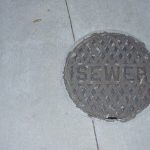Most of us tend to take our plumbing systems for granted and this is understandable. When the plumbing is working smoothly, there are no problems to worry about, and a lot of the system is hidden from sight. But, there are potential problems and early detection is essential to limit the extent of the water damage. Around 30% of all home insurance claims are directly related to water damage and these problems are expensive to fix. To get an accurate assessment of the potential for a plumbing problem, there is no substitute for an experienced local certified plumber. But, if you know what to look for there are four signs that there is a problem that needs to be investigated by your plumber.
1. Warm Spot on the Ground Floor
If you notice warm spots at certain points on the ground floor, this may be a serious plumbing and structural problem. These warm spots could mean that there is a slab leak under the floor and broken hot water pipes are leaking water. There are a number of possible causes, including shifting ground, aging structures, insufficient slab protection, a bad installation, and more. In some cases, you may see the flooring lift over the slab leak, and there may be other signs of water damage such as stains on the walls. This is a serious issue, and it cannot be ignored because there is a potential for structural damage, which can undermine the integrity of the entire home. Fixing a slab leak needs to be a priority because the problem will only worsen over time. If you suspect a slab leak, contact your local certified plumber immediately.
2. Sticky Toilet Handles
A toilet handle can be tricky to push and turn if it’s poorly installed. There is a chain that attaches to the ball float that is located inside the water tank. This chain can get stuck or tangled if it’s not the correct length, and this makes flushing tricky. The flapper and seal in the water tank can also make this problem worse, and these parts are prone to wear and tear. Aside from these problems, there could be an underlying issue caused by hard water. One of the more annoying aspects of hard water is the formation of scale that can form in plumbing pipes and on plumbing fixtures. This includes the aforementioned toilet components, which can be jammed up with scale. Fixing these problems is simple if you have some basic DIY skills and tools and you need appropriate replacement parts. But, if you don’t want to deal with these problems and other hard water issues, there is only one solution. Installing a water softener will remove the dissolved minerals that cause hard water, such as calcium, magnesium, and iron.
3. Strange Gurgling Noises
If you’re describing plumbing problems to a professional plumber on the phone, they are likely to ask you about strange gurgling noises. When you hear these noises, it’s almost like the plumbing system is grumbling and complaining and it’s talking to you. This may seem hyperbolic, but when the plumbing system is talking, it’s a good idea to listen. The source of these gurgling noises is often air that is being forced through the water and into the drain trap. This may be a sign that the ventilation system is defective, and there may be an obstruction located somewhere in the venting system. The gurgling noise will be a partial blockage initially, but when the fixture is used, the blockage will worsen. This debris that causes the blockage can include food debris, toilet paper, rust deposits, and more. As the vent becomes more clogged, you may experience a backup of water into the home, and the main sewer line may become compromised. This phenomenon may be accompanied by foul odors from the drains and this problem is pretty easy to identify. If you notice these gurgling noises and bad smells, contact your local professional plumber.
4. Insect Infestations
Like all forms of life, insects need access to water to survive and they are happy to migrate into your home if they can find water there. If you take a closer look at the areas where the insects have appeared, you may notice mildew growth or wet spots. There may be water leaks around the faucets, and leaking pipes under the sinks are a common cause. If you cannot see the source of the water leak easily and there are still insects around, the source of the leak may be hidden. The insects could even be using a broken pipe to gain access to your home. At this point, it’s important to seek professional help, an exterminator can deal with the insects, and a plumber can fix the water leak for you.
Deal with Underlying Plumbing Problems Quickly
When it comes to plumbing systems, any problems should be dealt with in a timely manner. These problems will not improve without intervention, and they tend to get worse over time. A more extensive plumbing problem causes more disruption, and it will be more expensive to fix. The aforementioned warning signs all indicate that something is wrong, and the plumbing system acts like an artery. If the artery becomes clogged, the drains may slow, multiple slow drains indicate a more extensive problem, and a camera inspection might be required.
3 Brief Plumbing Maintenance Tips
The home plumbing system is complex, but if you follow these three simple maintenance tips, you can prevent a number of problems:
1. Get the Water Pressure Checked
A plumber can check the water pressure to reduce the risk of leaks that can be caused by high water pressure.
2. Learn How to Shut-Off the Main Water Supply
When you’re dealing with a plumbing emergency, you need to shut-off the main water supply quickly. Every person living in the home needs to know where the shut-off valve is located, and it should be checked regularly to ensure that it moves easily.
3. Flush the Water Heater
The accumulation of sediment and scale in the water heater can cause a loss of performance and energy efficiency. This is often accompanied by strange noises and foul odors.
If you have water leaks in your home, contact your local certified plumber today.





